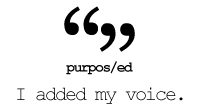 Since contributing to the original #500words campaign, my thoughts about the purpose of education have become less cogent. I still want to “bust a hole in the wall”; wishing to place learner independence and preparedness for life long learning at the heart of the debate. However, as I have continued teaching, researching, discussing, debating, I have found that my advocacy for student centred learning is paralleled by a growing belief that schools should be placed at the centre of the community. At times it feels as if these ideas should contradict each other, but I believe that they actually compliment each other. Here, I offer a list of connected (and disconnected) assertions, ideas and questions that are currently resonating with me. I hope that in sharing them, I can begin to form a more coherent thesis.
Since contributing to the original #500words campaign, my thoughts about the purpose of education have become less cogent. I still want to “bust a hole in the wall”; wishing to place learner independence and preparedness for life long learning at the heart of the debate. However, as I have continued teaching, researching, discussing, debating, I have found that my advocacy for student centred learning is paralleled by a growing belief that schools should be placed at the centre of the community. At times it feels as if these ideas should contradict each other, but I believe that they actually compliment each other. Here, I offer a list of connected (and disconnected) assertions, ideas and questions that are currently resonating with me. I hope that in sharing them, I can begin to form a more coherent thesis.
- Learning needs to be student centred. Education should offer choice and provide opportunity, not limit it.
- Schools need to offer a personalised curriculum. One that is adaptive, malleable… designed by learners themselves.
- There should be parity between subjects. But, should learning be structured in subjects?
- All learning needs to be encouraged – gaming, exploration, trial & error (when did we decide that getting things wrong was no longer part of learning?). Moreover, I’m concerned that the school system appears to be geared up to remove play, creativity and individuality as learners get older.
- Schools should be able to acknowledge and accredit all learning (formal and informal). Badges?
- We need to better prepare young people for the models of learning they will be engaged in after school. This means encouraging learner autonomy as well as co-dependence. The era of ‘sage on the stage’ is dead. It’s time to establish ‘guide on the side’ in all classrooms.
- We need to stop labelling students; and we need to stop allowing them to label themselves. A learners ability is not genetic; it is not pre-determined by us or anyone else.
- Education is not about grades or league tables. They are a meaningless, extrinsic motivator; and are detrimental to fostering effective learning.
- Learning is not linear. Learning is messy!
- School is not a bubble. Boundaries between learners and the real world need to be removed
- As one of the last public spaces, schools need to be an intrinsic part of the community. A “space where communities (children, parents and experts), can learn together”. Inter-age, individualised, co-dependent learning?
- Libraries should be at the heart of schools and their respective communities. Libraries should be like this one. And in the 21st century, they are about much more than books.
- Schools need to recognise that Online is ‘now’ NOT the future. Technology should be seamlessly integrated in to the learning experience. There needs to be overlap between physical and virtual spaces – opening up further opportunities for a personalised curriculum.
- Education needs to be wrestled out of the hands of governments. Communities need to take ownership of learning… freeing education of the fads and whims of politicians. Learning needs to be open/democratised.
- Schools should be charged by their communities to provide education that is relevant and creative.
- In the words of Simon Finch: “Something better change”
This post is my contribution to #500words – Take 2; the latest Purpos/ed campaign, asking the question: What is the purpose of education. Check out purposed.org.uk to see how you can join the debate.
